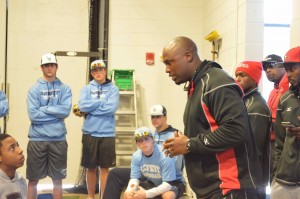
Unfortunately for young players, their success often times only occurs after they learn how to coach their coaches on how to coach them.
Coaching, facilitating and managing aren’t the same skill sets. Coaches are prepared to answer the questions below with clarity, often times before you can ask them. Facilitators are valuable for the purpose of front toss and putting balls on tees. Facilitators don’t require a teaching methodology. Managers are great at inspiring their players and don’t require “must have” teaching skills, such as knowledge about learning styles.
The definition of a coach, before it was used in athletics, was reserved for the transportation of people and/or things. A coach took you from A to Z.
To a fault in athletics today, the definition of a coach is any willing and able person who commits his time and energy to a team. Being a coach should be an earned position. On my end, I will continue to do my part to raise the standards.
Below are a few things that your coaches should know about you before you give them permission to coach you.
Performance Enhancer
My personal and business core values are excellence, humility, integrity, loyalty, stewardship and teamwork. When I’m functioning at my best, it’s because I’m upholding my core values. Without adhering to core values, you won’t be a good person and forget about being a good hitter. Core values are a performance enhancer.
What are your top three core values?
What are your coaches top three core values?
Learning style
The three major styles of learning are kinesthetic (learn by feeling), visual (learn by seeing) and auditory (learn by hearing). Coaches must know this in order to be effective teachers. Follow me here. Coaches only can teach if they know how you learn. If coaches don’t know how you learn, they aren’t teaching – they are talking and you aren’t learning, because you only are listening at best. If you aren’t learning, your coach isn’t teaching.
Here are the learning styles of some of my notable clients:
Kinesthetic (learn by feeling)
Kyle Parker, Colorado Rockies
Dexter Fowler, Chicago Cubs
Brandon Thomas, New York Yankees
Visual (learn by seeing)
Andruw Jones, MLB All-Star, Atlanta Braves, New York Yankees, Los Angeles Dodgers
Ashley Pauly, University of Georgia
Callix Crabbe, San Diego Padres
Auditory (learn by hearing)
Jason Heyward, St. Louis Cardinals
Armaan Painter, The Westminster School (11th grade)
Chris Nelson, Philadelphia Phillies
- What is your predominant learning style?
- What is the predominant learning style of your coach?
Listening styles
There are five major listening styles. One of them best describes you today.
Appreciative
They prefer to not have too think too much while listening; they’re not interested in too much detail or statistics.
Empathetic
Empathic listeners tune into people’s feelings. No matter what the speaker is saying, this type of listener is looking for the emotional motivations behind the words.
Comprehensive
They prefer facts and information presented in a linear, logical fashion with no jumps or digressions. They also like to weigh the speaker’s rationale with their own experiences to see whether it holds merit in their subjective view.
Discerning
These listeners simply focus on hearing and understanding what the speaker is saying without looking for underlying emotional motivations or preparing a counter argument. They often take many notes. They prefer information that flows in an even and well-ordered fashion.
Evaluative
Have you ever spoken with someone, sensing the whole time that rather than listening to what you’re saying, they’re finding fault with your statements and preparing a rebuttal? This person likely is a evaluative listener. Be aware that they may have missed important facts in your argument.
- What is your predominant listening style?
- What is the predominant listening style of your coach?
Mission Statement
When there is no mission, there is no direction, and if you don’t know where you’re going, any road will take you there. There will never be a day where it is a good idea to do anything outside of the protection of a clear mission. My personal mission in life is to be significant and to serve millions. One of the major reasons I share my knowledge through blogs and videos is to serve millions. Less than a thousand people read my blogs, but one day millions will. A coach can’t effectively coach you if he doesn’t know your mission in life.
- What is your personal mission statement?
- What is your coaches personal mission statement?
Methodology
We can do stuff all day long, but only when we have an effective method do we develop the skills needed to compete as an elite hitter.
The patent pending method that I created to develop hitters is called ATBATS. It’s simple to understand yet can be difficult to administer.
A-Assessment
T-Training for strength
B-Basics such as the load
A-Approach both physical and mental
T-Training for skill
S -Situational hitting
In addition to my methodology, I have a process for each part of the methodology. I will share that in my upcoming book. For now, realize that without a methodology, your development will occur by chance. Every coach or educator should teach using a methodology.
What is the teaching methodology that your coaches uses to teach you?
What, When, How
As a younger instructor, I struggled with keeping my mouth closed. I thought coaches were always supposed to be talking. Sometimes, the best advice is no advice. Coaches should be held accountable for two things before each practice and, depending on your listening and learning style, your coach can be silent for the remainder of the practice.
- What are we doing?
- Why are we doing it?
In order for your coach to properly coach you, he should be able to clearly explain what he wants you to do and why he wants you to do it. Here’s why it’s important for those two things to happen.
Until you know what you are doing and why you are doing it, how will you be able to do what he wants you to do?
If you aren’t being coached, you’re being managed. Are you okay with that? Then again, that all depends on your core values and mission statement.
Remember: Good hitters don’t work hard; they work smart.
For more information, visit www.diamonddirectors.com today.
BIO
C.J. Stewart has built a reputation as one of the leading professional hitting instructors in the country. He is a former professional baseball player in the Chicago Cubs organization and has also served as an area scout for the Cincinnati Reds. As founder and CEO of Diamond Directors Player Development, CJ has more than 12 years of player development experience and has built an impressive list of clients, including some of the top young prospects in baseball today. If your desire is to change your game for the better, C.J Stewart has a proven system of development and track record of success that can work for you.

Leave a Reply